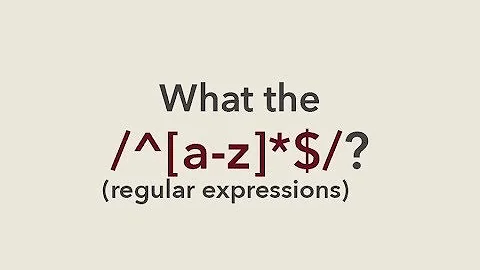Ruby regular expression using variable name
Solution 1
The code you think doesn't work, does:
var = "Value"
str = "a test Value"
p str.gsub( /#{var}/, 'foo' ) # => "a test foo"
Things get more interesting if var can contain regular expression meta-characters. If it does and you want those matacharacters to do what they usually do in a regular expression, then the same gsub will work:
var = "Value|a|test"
str = "a test Value"
str.gsub( /#{var}/, 'foo' ) # => "foo foo foo"
However, if your search string contains metacharacters and you do not want them interpreted as metacharacters, then use Regexp.escape like this:
var = "*This*"
str = "*This* is a string"
p str.gsub( /#{Regexp.escape(var)}/, 'foo' )
# => "foo is a string"
Or just give gsub a string instead of a regular expression. In MRI >= 1.8.7, gsub will treat a string replacement argument as a plain string, not a regular expression:
var = "*This*"
str = "*This* is a string"
p str.gsub(var, 'foo' ) # => "foo is a string"
(It used to be that a string replacement argument to gsub was automatically converted to a regular expression. I know it was that way in 1.6. I don't recall which version introduced the change).
As noted in other answers, you can use Regexp.new as an alternative to interpolation:
var = "*This*"
str = "*This* is a string"
p str.gsub(Regexp.new(Regexp.escape(var)), 'foo' )
# => "foo is a string"
Solution 2
It works, but you need to use gsub! or assign the return to another variable
var = "Value"
str = "a test Value"
str.gsub!( /#{var}/, 'foo' ) # Or this: new_str = str.gsub( /#{var}/, 'foo' )
puts str
Solution 3
Yes
str.gsub Regexp.new(var), 'foo'
Solution 4
You can use regular expressions through variables in ruby:
var = /Value/
str = "a test Value"
str.gsub( /#{var}/, 'foo' )
Solution 5
str.gsub( Regexp.new("#{var}"), 'foo' )
Related videos on Youtube
Comments
-
cpjolicoeur almost 2 years
Is is possible to create/use a regular expression pattern in ruby that is based on the value of a variable name?
For instance, we all know we can do the following with Ruby strings:
str = "my string" str2 = "This is #{str}" # => "This is my string"I'd like to do the same thing with regular expressions:
var = "Value" str = "a test Value" str.gsub( /#{var}/, 'foo' ) # => "a test foo"Obviously that doesn't work as listed, I only put it there as an example to show what I'd like to do. I need to regexp match based on the value of a variable's content.
-
 Tyler Collier over 8 yearsI'm not sure why this only has downvotes. I tried it and it works, even though you don't need the regex slashes in both the
Tyler Collier over 8 yearsI'm not sure why this only has downvotes. I tried it and it works, even though you don't need the regex slashes in both thevarvariable and gsub's first parameter. -
rj487 over 6 yearsI think it's
Regexp -
mahemoff over 6 yearsI think the point of the slashes in gsub was to show that a regex can contain a variable which is itself a regex. The variable doesn't have to be string type (and in fact, regex is better for reasons outlined in Wayne's answer).
-
Edgar Ortega over 4 yearsYes, it is
Regexpruby-doc.org/core-2.7.0/Regexp.html







